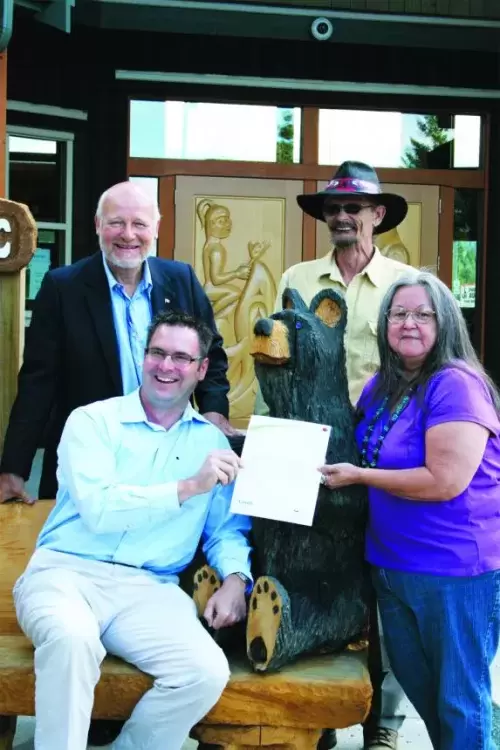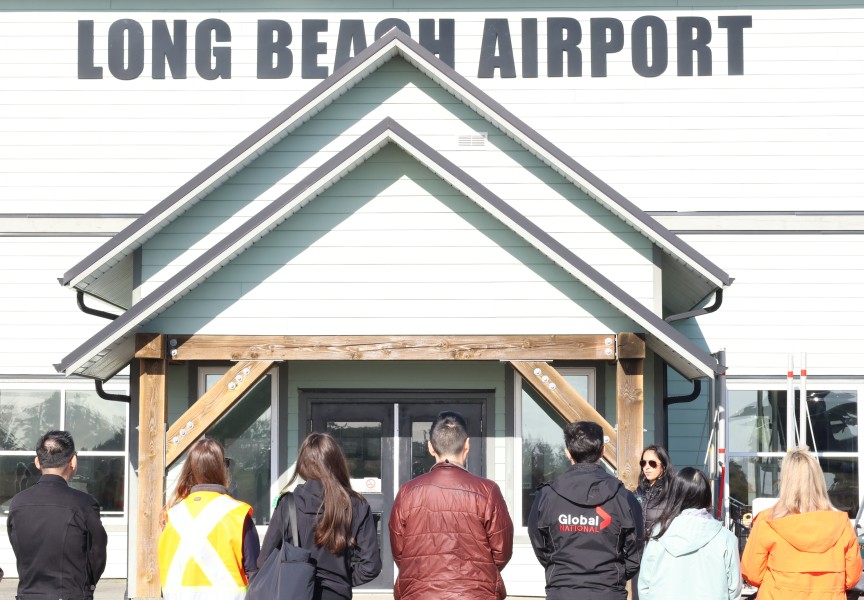Keith Hunter of First Nations Wildcrafters was encouraged by comments by Minister of Agriculture Don McRae when he visited the Alberni Valley on Aug. 15.
“He gets it,” said Hunter.
McRae met Hunter and Wildcrafters’ Anne C. Robinson at the Alberni Chamber of Commerce to present them with a cheque for $50,000. The money will be used for a pilot project that may help change the way we view the economy of the forest.
Phase 3 of the Alternate Crop/Forest Farming Field Pilot Project is the next step in proving that there is more value in the forest than just the trees. And if one can groom the forest to enhance certain conditions, increased forest food production could be only one of many benefits.
McRae said people get excited about a $3,000 tree, but they fail to notice all the value that is under that tree. He has friends that are mushroom harvesters, so he understands the potential for increased forest food production, he said.
Hunter said the project hopes to prove there are life-cycle options for that tree in a forest that provides different benefits at different times over the years. It’s not about comparing the value of a log against the value of a mushroom, however. It’s about better management practices that make good economic sense to foresters and other planners to allow for other production interests in the forest to occur.
Forest farming is more than just a novelty, said the minister. And Wildcrafters’ project will put theory into practice in select areas in Nuu-chah-nulth territory.
The concept is easy to talk about, said Hunter. What’s needed, however, is real-world numbers that show there can be a return on investment, and therefore prove that agroforestry can actually work.
“We take the long view of the forest,” said Robinson. At the core of what the company does is make decisions that will protect the forest so its benefits can be shared with the great-grandchildren and those yet to be born.
For Wildcrafters the forest is not just layers of economic value. There are cultural, social and health benefits that are worth preserving and nurturing. Nor is Wildcrafters opposed to logging. What they hope to do is make a strong economic case for managing the forest in a different way for all manner of forest users.
The pilot will utilize the Whole Systems Diversification Model that was developed by First Nations Wildcrafters. The premise of the model is to work towards abundance in the forest, not scarcity; work towards wellness and long-term social, spiritual and economic vibrancy. Community health and forest health is connected, said Hunter.
It’s taken three years to get to this stage of the project. After an initial case study, there were lots of meetings that had to take place with a multitude of stakeholders.
Hunter said Wildcrafters chose a number of areas in the forest that they had interest in for the field project, and they had to ensure there was no conflict with the plans others had for those areas. No sense choosing a site for the project, if there was a logging road slated to go through it, Hunter said.
These discussions, said Hunter, have already produced benefits, raising the level of trust, awareness and education to get people thinking about how forest practices can, for example, enhance the forest canopy for good berry production, or if thinning an area would create a better crop of mushrooms.
With Phase 3, Hunter is happy now to get out into the forest and put into practice some of the theories Wildcrafters and others have developed and perhaps, encourage others to see that a healthy diverse forest is, in fact, an economically viable long-term option.
By Debora Steel







